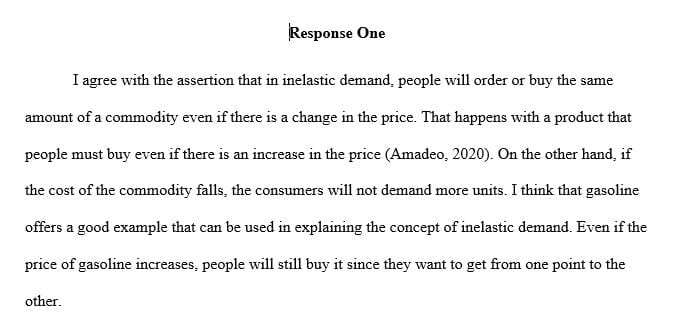Health care has both a consumption component and investment component
Discussion:
Justin Pribble posted Mar 26, 2020 10:28 PM
Subscribe
When a good is described as having an inelastic demand, this means despite the price the demand for the good will remain the same. Two examples given by M.Hall are salt and tobacco products. Despite the increase in tobacco prices and taxes in many states, the demand for the products continues on a steady curve. Another example given in the video content for this week is gasoline. The presenter, Professor Jacob Clifford, explains that this is why the gas prices may rise and fall with demand staying mostly the same. He also goes on to tell us that this is why gas stations don’t need to have sales because people still need gasoline in their vehicles to get to work. Despite the global crisis or stock market crashes the demand and price of gasoline still remain on the same curve.
-Justin
Jacob Clifford (2014, Nov19) Elasticity of Demand https://www.youtube.com/watch?v=HHcblIxiAAk
Hall, M. (2020, January 29). Elasticity vs. Inelasticity of Demand: What’s the Difference? Retrieved from https://www.investopedia.com/ask/answers/012915/what-difference-between-inelasticity-and-elasticity-demand.asp
Discussion post 2: Clint Williams posted Mar 26, 2020 12:05 AM
Subscribe
Health care has both a consumption component and investment component? What is the investment component, and can you provide an example?
Health care has both a consumption component and an investment component. Consumption components are goods that make the consumer feel better, while an investment commodity or component, determines the total amount of time available for market and nonmarket activities (Grossman, 1972). In other words, an increase in the stock of health reduces the time lost from the activities, and the monetary value of this reduction is an index of the return to an investment in health (Grossman, 1972). An example of Investment Component would be a decrease in the number of sick days will increase the time available for work and leisure, and the return to investment on health is the monetary value of the decrease in the number of sick days used or needed (Grossman, 1972). Implications for demand include a time component that impacts demand for health care.
Investment in health care is costly as consumers must trade off time and resources devoted to health, such as exercising at a local gym, against other goods. Optimal level of investment in health usually refers to marginal benefit equaling marginal cost. As we age, health depreciates so it becomes more costly to attain the same level of health capital or health stock as one ages. Age also decreases the marginal benefit of health. Optimal health investment will therefore decrease as we age. Investment in health where individuals invest in health capital when the motive for investing in health is to decrease the probability of illness and expenditure on consumption increases the individual’s utility provided that he is well, while investment in health increases the health capital stock according to the relation (Frimpong, A. O., 2014).
Grossman, M., (1972). “On the Concept of Health Capital and the Demand for Health” Journal of Political Economy. Retrieved from http://citeseerx.ist.psu.edu/viewdoc/download;jsessionid=9B3CD65AC6C4356069B043272679F704?doi=10.1.1.604.7202&rep=rep1&type=pdf
Frimpong, A. O., (2014). Health as an Investment Commodity: A Theoretical Analysis.” Journal of Behavioural Economics, Finance, Entrepreneurship, Accounting and Transport. Retrieved from http://pubs.sciepub.com/jbe/2/3/1/#
R/ Clint…
Answer preview to health care has both a consumption component and investment component

253 words


